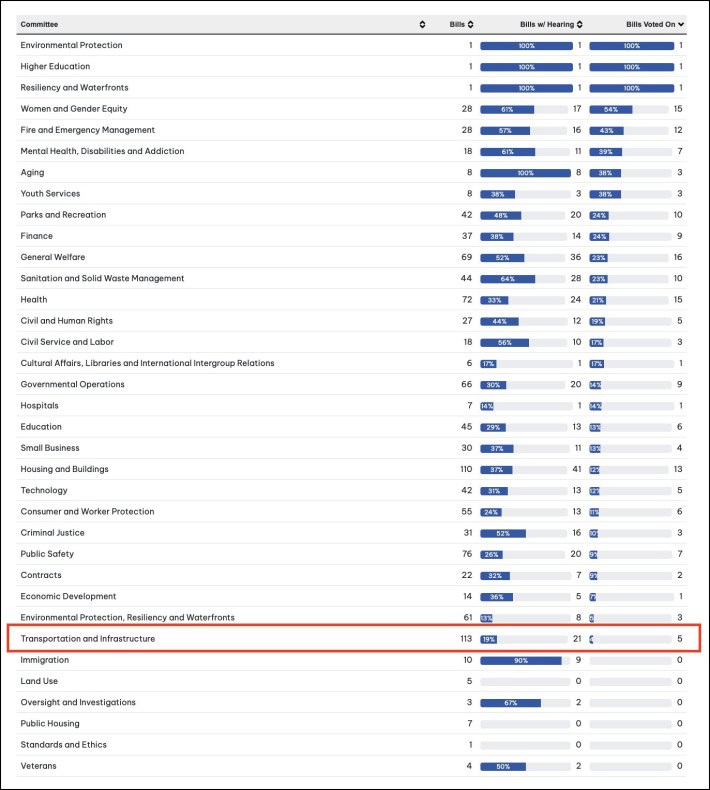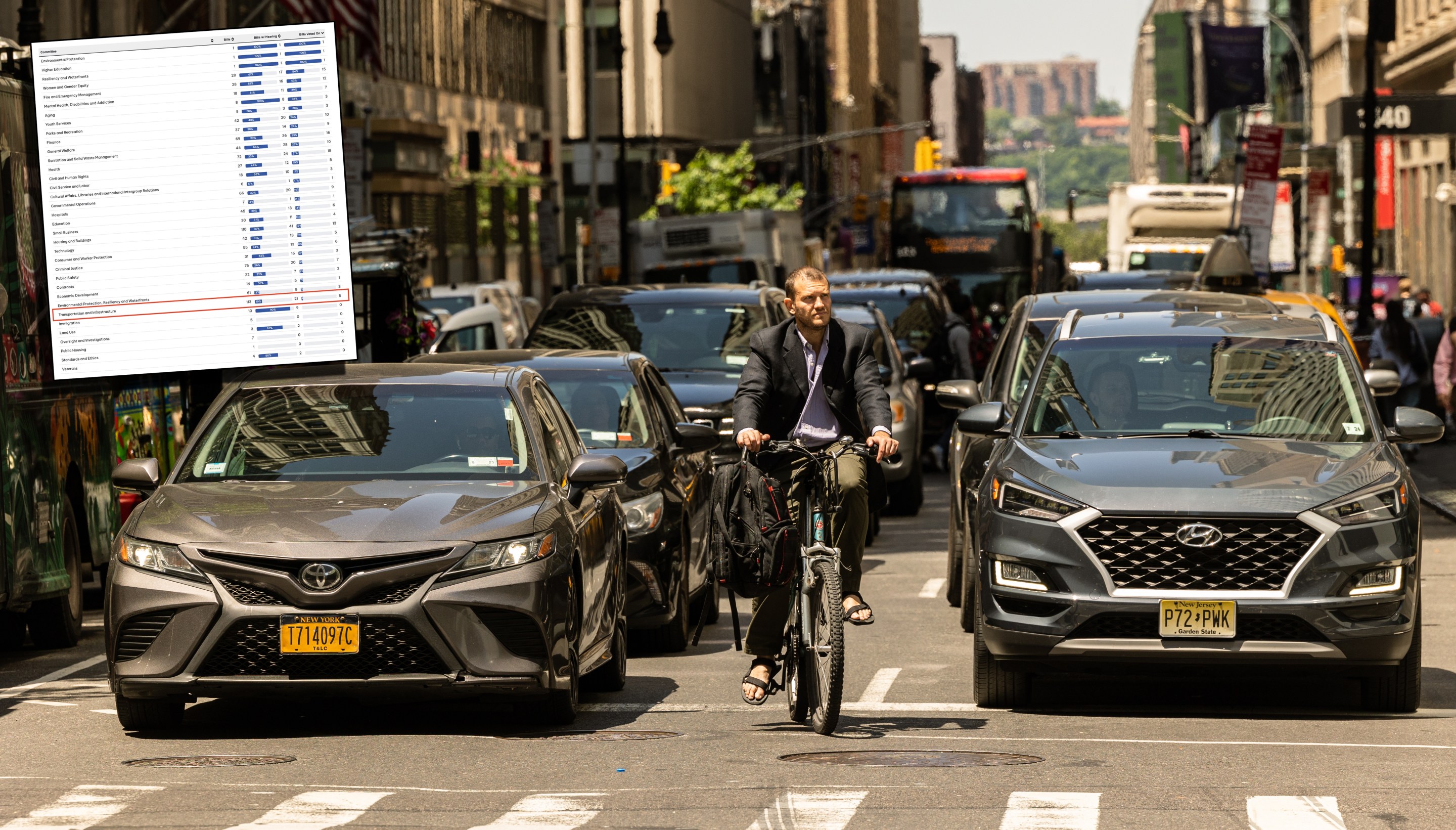So much for the weighty issues of the day.
The City Council's Transportation and Infrastructure Committee will have its regular meeting on Thursday with only one bill on the agenda: a piece of legislation that would require the city to install mile markers along parts of Cross Bay Boulevard, Beach Channel Drive, Rockaway Point Boulevard, and Rockaway Beach Boulevard.
The bill has two sponsors.
There does not appear to be any opposition, and no one submitted testimony, pro or con, at a lengthy hearing in April that was entirely consumed by other far-more-crucial bills with far more Council sponsors, including:
- Intro 417, which would streamline the process for the city to install bike lanes and other safety measures. The bill has a majority of Council members in support, yet no vote is scheduled.
- Intro 501, which would create a way for residents to report drivers who are parked in bike or bus lanes. The bill, which has been substantially modified as a step towards passage, has a majority of Council members in support, yet no vote is scheduled.
- Intro 927, which would establish a task force to "determine whether and where charging stations for bicycles with electric assist can be built for exclusive use by food delivery workers, an important issue given the spate of lithium-ion battery fires. The bill has 12 sponsors, but no vote has been set.
- Intro 712, which would "require the Department of Transportation to report on evasion of red light cameras or school speed cameras by motor vehicles with unreadable license plates," another key issue right now as congestion pricing looms. It has 10 sponsors.
In all, 15 other Transportation Committee bills have also had hearings and have more sponsors than the mile-marker bill, yet none is scheduled for a vote.
Those important bills include:
- Intro 905, which "would call on the Department of Transportation to ensure that all street resurfacing work be finalized within two weeks of the start of work. The bill has a majority of Council members in support yet does not have a hearing scheduled.
- Intro 708, which would require the DOT to "redesign the city’s truck route network to improve safety, increase visibility, reduce traffic congestion and emissions, and reduce vehicle miles traveled." It has 40 sponsors (including the committee's chair, Selvena Brooks-Powers), yet has no vote scheduled.
- Intro 924, which would require the DOT to study "using street design" as a means to ... reduce the use of residential streets "by commercial vehicles." It has 17 sponsors, but no vote is set.
- Even Intro 555, which would "paint school safety signs and install overhead school safety signs on each street where a school entrance is located to alert drivers to the presence of school-aged children and pedestrians," doesn't have a vote scheduled.
Overall, the Transportation Committee is moving at a leisurely pace. According to Council records, members of the committee have submitted the most bills, 113, of any committee. But only 21 bills, or 19 percent, have gotten a hearing.
And only five bills (4 percent) have passed.
Compared to other committees, the Transportation Committee's heartbeat is faint:
- The Housing and Buildings Committee has a comparable number of bills proposed (110), but has had hearings on 37 percent of them, and passed 12 percent.
- The General Welfare Committee has held hearings on 52 percent of its 69 bills, and passed 23 percent of them.
- The Sanitation and Solid Waste Management has held hearings on 64 percent of its 44 bills and passed 23 percent of them.
- The Parks and Recreation has held hearings on 48 percent of its 42 bills and passed 24 percent of them.
- The Health Committee has held hearings on 33 percent of its 72 bills and passed 21 percent of them.
The only other major committee with as poor a quantity of hearings is the Environmental Protection, Resiliency and Waterfronts Committee — but even that committee has passed a higher percentage of bills, 5 percent.
Here's a breakdown of the committee's work from intro.nyc:

It's unclear what's going on, but advocates are noticing that that Thursday's hearing is a low-wattage event:
This Thursday the Transportation Committee lead by @CMBrooksPowers will hold a vote on bills
— Jehiah (@jehiah) July 9, 2023
The only bill scheduled for a vote currently is Intro 853 (2 sponsors) to require installing mile markers on 3 roads.
Why no vote for the 13 bills with hearings + way more sponsors?
Two emails sent to Brooks-Powers, a staff member and a staffer at the Council were not responded to at all. But Brooks-Powers did respond on Twitter:
They can argue all they like, but the data shows you are anti-democratic and don’t get legislation done.
— NYC Climate Package (@ClimatePackage) July 9, 2023
Nonetheless, advocates are surprised by the slow pace of such an important committee during a period of consistently high crashes and injuries, and underwhelming performance on bike- and bus-lane construction by the Adams administration:
“At least in the de Blasio years, we had an active and smartly led Council to fill the void left by a mayor who was more transactional than policy driven," said Jon Orcutt, a former DOT official who's now head of advocacy at Bike New York. "Today, the void seems to have stretched to both sides of City Hall.”
Elizabeth Adams of Transportation Alternatives said that rising traffic violence shows the need for “urgent action."
"We need to be passing legislation to protect New Yorkers from crashes and move us toward a more transit accessible city with greater investment in infrastructure,” she added.
Jehiah Czebotar, the advocate who created the Council tracking site, intro.nyc, recalled Brooks-Powers's promise to visit as many Council districts as she could in her first term and suggested it didn't amount to much.
"After 18 months, she has only introduced three transportation bills," said Czebotar. "What is her vision for legislation to improve transportation in New York City and address equity issues for everyone outside of cars?"
A spokesperson for the City Council declined to comment.






